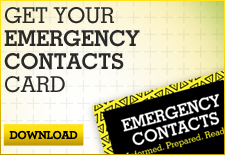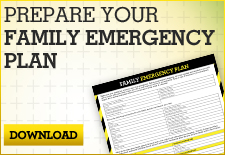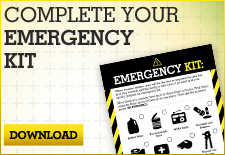
Disasters can happen… at any time. Be prepared to take action before, during and after.
Earthquakes
An earthquake is the sudden, rapid shaking of the earth caused by the breaking and shifting of rock deep underground. Earthquakes themselves rarely cause death or injury ‐ most deaths and injuries occur by falling objects and debris or when buildings collapse. Although earthquakes are sometimes believed to be a West Coast phenomenon, there are actually 45 states and territories throughout the United States that are at moderate to high risk of experiencing earthquakes. Earthquakes are sudden and unpredictable, so it is important for you and your family to prepare ahead of time.
An earthquake is the sudden, rapid shaking of the earth caused by the breaking and shifting of rock deep underground. Earthquakes themselves rarely cause death or injury ‐ most deaths and injuries occur by falling objects and debris or when buildings collapse. Although earthquakes are sometimes believed to be a West Coast phenomenon, there are actually 45 states and territories throughout the United States that are at moderate to high risk of experiencing earthquakes. Earthquakes are sudden and unpredictable, so it is important for you and your family to prepare ahead of time.
Indiana and Illinois lie in the most seismically active region east of the Rocky Mountains. This region consists of two main areas, the New Madrid Seismic Zone and the Wabash Valley Seismic Zone. These zones – or areas that are prone to earthquakes from one fault ‐ include many geologic faults that are capable of producing earthquakes. Jasper County, IN is located in close proximity to many of these potentially unstable faults.
Know Terms Frequently Used for Earthquake Events:
A sudden slipping or movement of a portion of the earth’s crust accompanied and followed by a series of vibrations.An earthquake of similar or lesser intensity that follows the main earthquake.
An earthquake of similar or lesser intensity that follows the main earthquake.
The break in the earth’s crust which moves during an earthquake. The movement may range from less than an inch to more than 10 yards in a severe earthquake.
The place on the earth’s surface where the earthquake rupture began. Once fault slippage begins, it expands along the fault during the earthquake and can extend hundreds of miles.
Vibrations that travel outward from the earthquake fault at speeds of several miles per second. Although fault slippage by itself can cause considerable damage, the vibrations of seismic waves cause most of the destruction during earthquakes.
The amount of energy released during an earthquake, which is computed from the amplitude of the seismic waves. A magnitude of 7.0 on the Richter Scale indicates an extremely strong earthquake. Each whole number on the scale represents an increase of about 30 times more energy released than the previous whole number represents. Therefore, an earthquake measuring 6.0 is about 30 times more powerful than one measuring 5.0.
Before
Before an earthquake, hold drills with your family members so everyone knows what to do. These drills should include identifying safe areas in your house as well as potential hazards that might exist around your house.
1 – Complete the Family Emergency Plan and discuss it as a family. This is a simple way of keeping each member of the family informed on critical information: where to reconnect should you become separated, who to call, and what you will do should an earthquake occur.
2 – Complete the Emergency Contacts Card and place one in your Emergency Kit.
3 – Prepare an Emergency Kit. The Emergency Kit should be easily accessible should you and your family be forced to shelter in place (stay at home) for a period of time.
To be ready for earthquakes you should add dust masks, plastic sheeting, duct tape and scissors to your basic emergency kit.
- If you rent your home, renter’s insurance is a great solution to protect yourself and your family from the cost of repairs and replacing your belongings.
- If you own your home, homeowner’s insurance is the best way to be prepared for the costs associated with repairing cracked foundations, water or fire damage and paying to replace any destroyed belongings.
- Store breakable items such as dishes, glasses and bottled foods in cabinets that close and latch
securely. - Fasten shelves securely to walls and place large or heavy objects on lower shelves will help reduce injuries during an earthquake.
- Anchor overhead lighting fixtures and hang heavy items such as pictures and mirrors away from beds, couches, and anywhere people sit.
- Take a look at your house and locate safe spots in each room under a sturdy table or against an inside wall.
- Have a licensed professional repair inflexible utility connections, defective electrical wiring and leaky gas lines. Flexible fittings are more resistant to damage.
During
Earthquakes occur suddenly and without warning, the best action for you and your family will typically be to shelter in place. Remain calm, stop and take cover from falling debris.
Earthquakes occur suddenly and without warning, the best action for you and your family will typically be to shelter in place. Remain calm, stop and take cover from falling debris.
- Take cover under a sturdy desk, table, or bench or against an inside wall, and hold on. If there isn’t a table or desk near you, cover your face and head with your arms and crouch in an inside corner of the building.
- Stay away from glass, windows, outside doors and walls and anything that could fall, such as lighting fixtures or furniture.
- If you are in bed when the earthquake strikes, stay there (unless your bed is under a heavy light fixture, if so move to the nearest safe place. Hold on and protect your head with a pillow.
- Use a doorway for shelter only if it is in close proximity to you and if you know it is a strongly supported, load bearing doorway.
- Stay inside until the shaking stops and it is safe to go outside. Most injuries during earthquakes occur when people are hit by falling objects when entering into or exiting from buildings.
- Be aware that the electricity may go out or the sprinkler systems or fire alarms may turn on. Do not use the elevators.
Stay there. Move away from buildings, streetlights and utility wires.
- Stop as quickly as safety permits and stay in the vehicle. Avoid stopping near or under buildings, trees, overpasses and utility wires.
- Do not attempt to drive across bridges or overpasses that appear to have been damaged.
- Do not light a match or use a cigarette lighter.
- If possible, cover your mouth with a handkerchief or clothing. Do not move about or kick up dust.
- Tap on a pipe or wall so rescuers can locate you. Use a whistle if one is available. Shout only as a last resort, as shouting can cause you to inhale dangerous amounts of dust.
After
After an earthquake, be prepared for aftershocks. Assess your environment for hazards like broken glass, fallen trees or downed power lines before you move from your location. Remember that unless you need to evacuate or are instructed to evacuate, stay off of the roads to keep the streets clear for emergency vehicles. If you do evacuate, leave a message at home letting family, friends, and / or local officials know where you can be found.
After an earthquake, be prepared for aftershocks. Assess your environment for hazards like broken glass, fallen trees or downed power lines before you move from your location. Remember that unless you need to evacuate or are instructed to evacuate, stay off of the roads to keep the streets clear for emergency vehicles. If you do evacuate, leave a message at home letting family, friends, and / or local officials know where you can be found.
- Check for gas and water leaks, broken electrical wiring or sewage lines. If there is damage, turn the utility off at the source and immediately report gas leaks to your utility company. Check for downed power lines; warn others to stay away.
- Check your building for cracks and damage, including the roof, chimneys and foundation.
- Avoid using the phone unless you are in a life‐threatening situation.
- Turn on your portable radio for instructions and news reports. For your own safety, cooperate fully with public safety officials and follow instructions.



